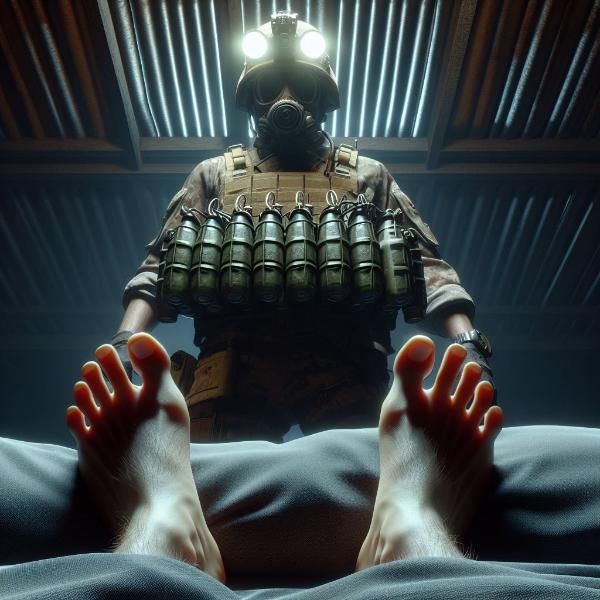The roar of war is deafening. Machine guns rumble like a tropical storm battering a tin roof, and artillery booms like volleys of thunder. The stench of war is pungent. Ignited gunpowder reeks like burning heaps of dung, and spilled blood stinks like an industrial abattoir.
The view of war is, to you, invisible. You can’t tell whether it’s dark or you’re blind, but everything has the black color of a void universe. You are injured: that’s what you can tell. Although you don’t feel any pain, you’re utterly paralyzed. You might as well have been a spirit if it wasn’t for a faint sense of proprioception.
You’re lying supine on something slightly tingly but soft that could be sawdust. Your immediate environment is still, and your location is concealed. Despite your immobility, you feel comfy and safe, removed from the peril of war as if being sheltered from a storm under a tin roof.
But like a first droplet leaking through a hole on a tin roof, your private comfort is suddenly violated. The ground below you sags, and through the roar of war cuts a clanky, whirring, sinister noise, approaching. A machine-gun robot! It’s after you, looking for you amid the rubble of the battle, fixed on doing the only thing it’s made to do: find you and finish you off.
Terror descends upon you with the force of a tin roof collapsing under a pounding hurricane. Before you didn’t care, but now you wish it’s dark and you’re not blind. Although you can’t move anyway, you try to keep quiet. You strive to hold your breath, but your escalating heartbeat doesn’t help. Your will is pointless, you’re powerless. It knows where you are. It’s getting closer with the directness of falling rain.
Deluged by desperation, exerting a superhuman effort, you finally manage to move. You join your hands above your hammering chest and knit your fingers together in a hopeless gesture of supplication. Simultaneously, you whine and mumble inarticulate cries for mercy. Fear makes you disregard your awareness of its primary programmed specification: mercilessness.
At the apex of despair, the dreadful sound of metallic advance subsides somewhere beside your feet. And after a spell of anguishing silence, a dry click turns on a light. You’re not blind. You see your body lying on a frayed surgical pad and, by your naked feet, below a corrugated tin roof, a torch on the forehead of a standing human soldier.
Relief soothes you like the rumble of a storm that diminishes to a mellow pitter-patter of drizzling. It wasn’t the robot. You must have been rescued and brought to the military hospital. You’re probably going to be operated and regain your able-bodiedness. But something still doesn’t feel quite alright. Why is there a soldier standing still above you instead of a doctor, you wonder, and why is he staring at you with this numb, ghastly look?
While your distress is being renewed by the moment, without a tinge of expression fleeting over his dim face, he moves. As if in a habitual procedure, he stretches your legs asunder, unclips a hand grenade from his tactical vest, unpins it with his teeth, places it gingerly in your crotch, recloses your legs tightly around it, and waits. While you’re still entreating him to stop with horrified eyes, the explosion blasts the lower part of your body together with him into a flurry of gory flesh.
An excruciating twinge where your abdomen used to be almost instantly recedes to a stinging after-pain on your neck before ebbing altogether back to total numbness. You must be dead, you think. Yet, you think. And your senses are still working, regarding the corrugated tin roof and listening to the roar of war intensifying again over it like a battering tropical storm.

